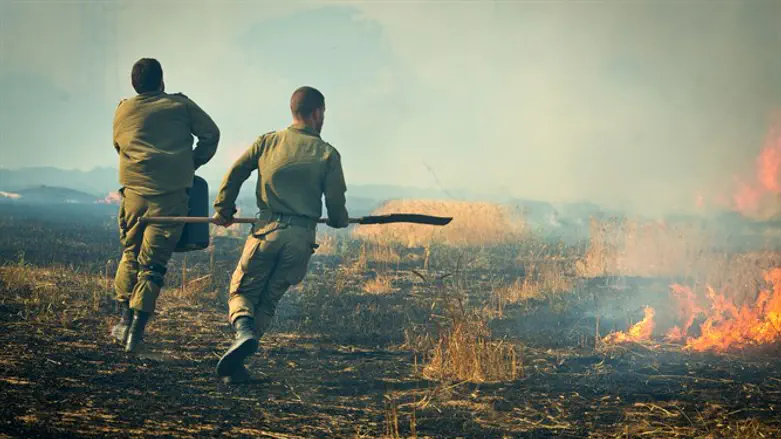
In July 2005, mere weeks before Israel's governmental auto-immune disorder caused the country to turn on itself and expel 8,500 of its most exemplary citizens from their life projects, no arrangements had yet been made for the majority of Gush Katif farmers. Even according to official claims, arrangements had been made for only 50-60 of the area’s 170 farmers.
Interior Ministry documents indicated negotiations began about a month prior, seeking to reach an agreement to supply alternate farmland areas for about 50 farmers, while most remained without a solution. Government officials at the time indicated a solution would not be found for the majority of area farmers, whose livelihood was being uprooted along with their homes and families.
As the first Jewish residents of Gaza began voluntarily leaving their homes, Muslims attacked Sderot and Gush Katif with mortar shells and opened fire on IDF positions. The government officially stated the forced evacuation would start after August 15, the day after the Jewish fast day of Tisha B'Av commemorated the destruction of both Jewish Temples on the Temple Mount. Evacuation under fire was the fear that gripped headlines, as Prime Minister Ariel Sharon repeatedly assured, "There will be a disengagement, and there will be no fire."

Ten years later, in an interview with Army Radio, Gilad Sharon, the son of the late Prime Minister, called the fate meted out to the thousands of Jews booted out of their homes in Gush Katif by his father “unfortunate, but necessary.”
“No one misses that area," Gilad Sharon said. "Even if some of those who left Gush Katif do miss it, most of them don't.
“After all, we returned to all the places we had held in Gaza during last summer's Operation Protective Edge. No one, except for a few nuts, suggested we remain there.”
At the time of the expulsion itself, even the defense establishment seemed naïve regarding the threat Gaza would pose and what it would take to neutralize it. For example, Deputy Defense Minister Zev Boim stated at the time, "I don't see a possibility that simultaneously, if we come under fire during withdrawal, that we will be able to act massively against Palestinian terror to stop the fire and also to continue the withdrawal. We would deliver a harsh strike… The worst-case scenario would require 10 days to two weeks of a heavy strike against terror to uproot it."
Today, field-expedient incendiary kites seem harder to deal with than the worst-case scenario back then. For Gilad Sharon, whose ranch has been hit repeatedly by fire from the place where no-one except for a few fanatic extremists suggested we remain, it is intolerable.
"It can't be that one side of the fence is green and the other black, it doesn't make sense," Sharon said this week in an interview with Radio 101.5FM. "There's an elected government there organized to burn our territory, and we do nothing? If the Argentinians burned the Brazilians' territories, the Brazilians wouldn't burn back?"

Sharon added "this isn't fate and it's manageable. They have to be offset for every shekel of damage they cause: the fires in the agricultural areas, the forests, and the nature reserves. We must collect this immediately from the funds Israel collects for the Palestinians. There's no reason why our taxes should pay for the damage caused to us by the Palestinians."
What about the damage caused to Gaza's Jewish farmers by the Gilad Sharons? Military historian Arye Yitzchaki says "Gilad Sharon pushed his father to expel Gaza Jews." Indeed, in Gilad Sharon's 2011 biography of his father entitled Sharon: The Life of a Leader, Gilad contended he had convinced his father to uproot the thriving, decades-old communities.
Yitzchaki called on the Likud to cancel Sharon's membership, and to confiscate Havat Hashikmim to establish a new community for those expelled from Gush Katif. "In my opinion that would settle the score for what was done in the expulsion."
Does Gilad Sharon suggest Israel respond as Argentina would to a threat to her security or an insult to her territorial integrity? In 1982, a war was initiated over Argentinean claims to the sheep-heavy Falkland Islands off the Argentine coast and the British rejection of those claims. In 72 days of warfare UK soldiers managed to kill over 700 Argentinians. The British offensive, never labeled a “massacre”, cost an average of 10 Argentinean lives per day.
Gilad Sharon has defended himself stating he has no regrets despite the numerous military operations and rocket fire following the Gaza expulsion. Sharon said it "clearly saved lives" in the long run and prevented Israel from having to "bring out piles of bodies".
"There are many people who are angry, but at least they're alive," Sharon added. "Gaza is a death trap and I think it's good that we're not there."
Gilad Sharon mustn't have known what he was saying when he urged Israel to adopt the Argentinian model this week. Of course, they were only fighting over a teeny offshore property; Israel is defending its very life.
